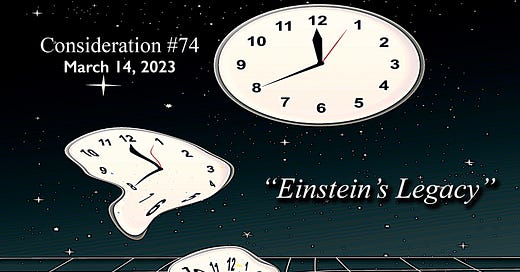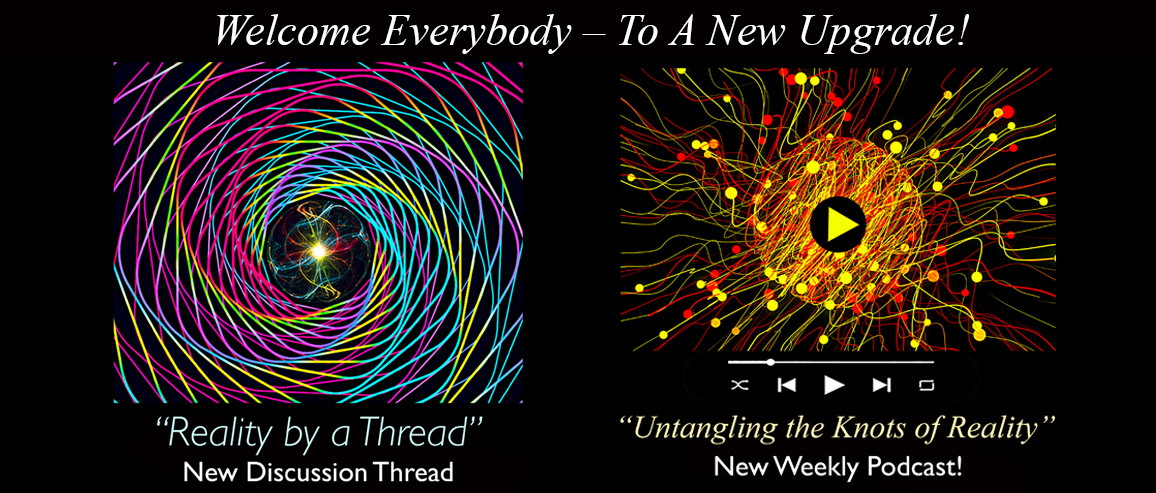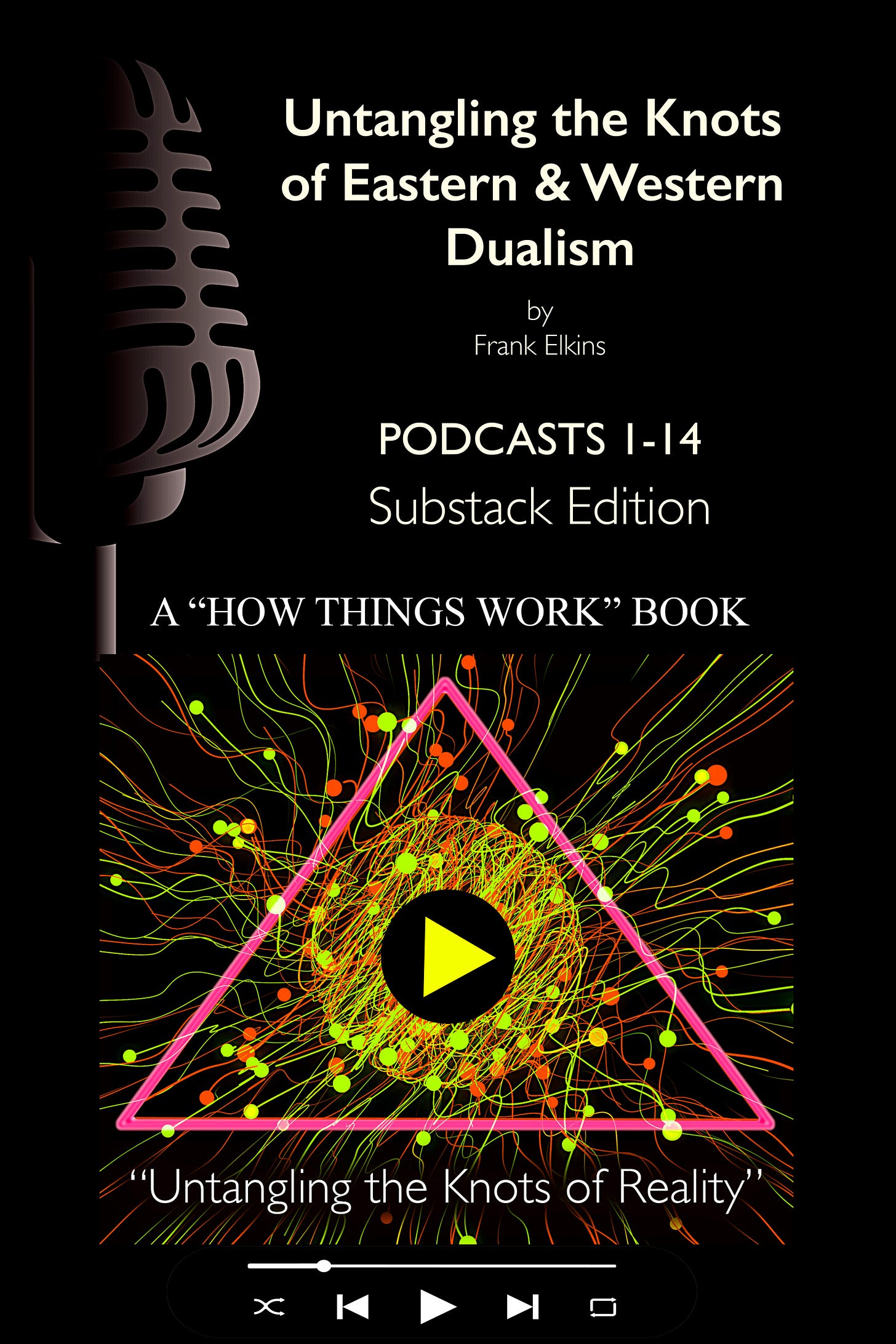How Things Work: A Brief History of Reality
BOOK II: The Power of Three – #74. "Einstein's Legacy"
Be A Part of the Conversation!
Tuesday, March 14, 2023
“I have no special talent. I am only passionately curious.”
― Albert Einstein
PREFACE
Welcome Everybody!
This newsletter concludes our consideration of Part One of Book II related to understanding reality through science, up to Einstein’s theories of Relativity and the Digital Revolution. We return to our consideration of science in Book III and Book IV related to Quantum Physics, the Big Bang, and String Theory. However, before returning to the “now completely rational” considerations of modern science, it is important to consider and understand the traditional rational and moral considerations of theology and religion.
“Einstein becomes the transition from ‘empirical’ science to ‘rational’ science.”
Einstein represents the peak, and transformation, of modern science. However, with his revolutionary breakthrough regarding How Things Work came a completely new science related to the newly discovered atom. Ironically, the “world” of the atom was nothing like the “world” of physical reality. Einstein becomes the transition from “empirical” science to “rational” science. To understand this new rational abstract science, it is important to understand the spiritual, or religious, connections to its original metaphysical roots. It becomes more and more difficult to understand the metaphysics of quantum mechanics without understanding the metaphysics of theology.
“Even Einstein sensed the ‘spiritual mystery’ of the universe…”
Einstein was not a fan of “organized religion.” However, he often discussed his “awe” in recognizing the miracle of the universe, and life. Even Einstein sensed the “spiritual mystery” of the universe and existence:
“A knowledge of the existence of something we cannot penetrate, of the manifestations of the profoundest reason and the most radiant beauty - it is this knowledge and this emotion that constitute the truly religious attitude; in this sense, and in this alone, I am a deeply religious man…
If something is in me which can be called religious then it is the unbounded admiration for the structure of the world so far as our science can reveal it.”
– Albert Einstein
In Aristotelian terms, Einstein’s “unbounded admiration for the structure of the world,” stemming from “something we cannot penetrate,” based on the “profoundest reason and most radiant beauty,” is what Aristotle called “the Good,” and was the focus of his metaphysics. It is what religious people call “faith.”
CONSIDERATION #74 – Einstein’s Legacy
In terms of the universe and our understanding of reality, nobody has altered our perception of it more than Albert Einstein. His Special and General Theories of Relativity explain virtually everything in the universe that is composed of atoms. To this day, Einstein’s perception of the “large” world remains uncontested in any serious way. However, the subatomic world of the atom seemed to have problems with Einstein’s concept of How Things Work. Einstein completely understood the world made up of atoms, however, the world where atoms existed seemed a much stranger place. Even for Einstein.
“Now, there are two sets of rules in physics depending on whether you want solutions for a tangible universe, or whether you want solutions for the world of the atomic and subatomic particles that constitute it.”
Despite his efforts to unify the laws of physics in both the world of the large and the world of the small, it proved beyond his ability. And the ability of anyone else, so far. Now, there are two sets of rules in physics depending on whether you want solutions for a tangible universe, or whether you want solutions for the world of the atomic and subatomic particles that constitute it. Just as Einstein’s theories revolutionized how we saw the universe, quantum mechanics would revolutionize the way we thought of virtually everything, including consciousness.
“…they did not solve the human paradox: why do human beings always use knowledge for both good and evil?”
Although Einstein, and his revolutionary theories, solved the paradoxes related to time, space, energy, gravity, and matter, they did not solve the human paradox: why do human beings always use knowledge for both good and evil? Using Einstein’s method of inquiry, we might come to consider and understand that they are also two sides of the same coin; they cannot be separated any more than time and space, energy and matter or the effects of gravity on space-time.
“Science and religion no longer shared a similar metaphysics and goal…”
With the emergence of modern science as the greatest and most practical influence of the 20th century, questions regarding the metaphysical nature of good and evil were no longer the subjects of empirical inquiry; they now resided completely in the world of religion and philosophy. Science and religion no longer shared a similar metaphysics and goal; the two main fountains of human knowledge and understanding had become adversaries in the search for "truth."
POSTSCRIPT
Many of the consequences resulting from Einstein’s understanding of the universe were so profound that even he had a difficult time accepting them. Perhaps the most consequential was the development of Quantum Mechanics. While Einstein’s theories of relativity revolutionized our understanding of the empirical physical universe, the strange world of quantum, or sub-atomic, physics resulting from it, could not be limited by such such objectivity. A reality of unlimited potential possibility as manifested through the limited dimensions of time, space, and gravity as an expression of probability was a reality too unimaginable for even Einstein to completely accept or acknowledge.
“Einstein’s universe was still composed of ‘physical objects’ that were regulated by the ‘laws of physics’…”
The quantum universe was not the universe Einstein had expected. It did not support the rationality related to the “objects” he understood to be the universe. Einstein’s universe was still composed of “physical things,” such as suns, planets, and galaxies, that were regulated by the “laws of physics” such as time, space, and gravity. However, the laws of Quantum Mechanics were not limited by these traditional empirical values.
“The quantum experience is not an experience of ‘being’ anything; it is an experience of being ‘potentially everything,’ ‘anything,’ or ‘nothing;’ all at ‘the same time.’”
The atoms that composed the objects known as the universe existed beyond the limitations of the universe they manifested. The quantum experience is not an experience of “being” anything; it is an experience of being “potentially everything,” “anything,” or “nothing;” all at “the same time.” In addition, it suggests not a “static” or even “evolving” universe, but instead a “devolving” universe returning to its “pre-Big Bang” state of existence prior to the laws of physics including time, space, and most likely gravity. The universe will eventually “disappear” from existence, or reality.
“He was so sure that the universe was static that he originally “fudged” a factor in his equations…”
Einstein believed that the universe existed in a “steady state” as a static entity. He was so sure that the universe was static that he originally “fudged” a factor in his equations allowing for a “cosmic constant” that would make a “stable” universe possible. However, in the 1920’s, several astronomers confirmed that the universe was in fact expanding as would have been predicted by General Relativity had Einstein not fudged the math. Einstein would eventually admit that the “cosmological constant” was the “greatest blunder” of his career.
“Einstein could not accept what he considered to be an ‘imbalance’ in the universe that seemed to make no rational sense.”
Einstein had established that energy could not disappear from existence; it could only change form. Therefore, how could the universe essentially disappear from existence? Einstein could not accept what he considered to be an “imbalance” in the universe that seemed to make no rational sense. Why would the universe be essentially in a state of “self-destruction” for no apparent reason whatsoever? That was not rational.
“Einstein had opened a wormhole in science that transformed it from an empirical discipline of the senses to an abstract rational focus of the mind…”
However, quantum physics is beginning to consider new concepts related to dark matter and antimatter that may rectify this imbalance. Einstein had opened a wormhole in science that transformed it from an empirical discipline of the senses to an abstract rational focus of the mind; something beyond even his capacity to understand at the time. Book III considers some of the metaphysical consequences of this new “quantum reality.” In Book IV, The Cosmic Symphony – Overtones of String Theory we continue from where Einstein left off: a consideration of the “quantum world” and what that means to our concept of reality.
Next week we begin a transition into the second consideration of Book II – “Understanding Reality Through Religion.” This will be much more interesting and fun than you expect!
Expand the Conversation by Upgrading to “Reality by a Thread!”
Excerpt from Tomorrow’s Untangling the Knots of Reality – Podcast #39: "Online Video Course Preview"
This Week on “The Thread”…
•Untangling the Knots of Reality Podcast: #39 "Online Video Course Preview" (“Over the next few months, I will be sharing these video lessons with my paid subscribers until we have completed the first section, which is five more lessons. So, every once-in-a-while, you will receive a video lesson instead of a podcast until we have completed the series. This way, all “Reality by a Thread” subscribers will receive the first section of the course FREE – Before it becomes available on UDEMY as a paid course…” )
•Reality by a Thread Discussion Thread: Previewing Book V: “Level One Conscious Awareness” (“The first level of human conscious awareness is “self-awareness” reflecting the existences of a “self” and a separate physical “reality” related to that “self.” It is the basic level of human functioning. Although human beings maintain a certain level of instinct, at this level of human conscious awareness they are also capable of utilizing basic inductive logic to recognize simple patterns and make simple choices. Human beings can “survive” at this level of conscious awareness, but they cannot change the nature of their reality...”)
•FREE PDF Download of Book IV: “The Cosmic Symphony – Overtones of String Theory” plus other Free Books, Discounts and Benefits.
UPGRADE NOW!
Now Available! "Untangling the Knots of Eastern & Western Dualism"
A New Substack Edition Book! – Free PDF Download for Paid Subscribers – 20% Off for Free Subscribers!! Print Editions Also Available...
These books are not designed to tell you what the truth about Reality is, only to help you consider and explore the long evolution of thought that has brought us to our present awareness. To elevate the conversation about the big picture in a thoughtful, reasonable, and respectful manner. Something not often encountered on today’s social media platforms. In a nutshell, I wrote these books to help us understand each other better, in addition to our individual and collective responsibility in creating the Reality that we now experience. And the Reality we want to experience in the future.
If you find yourself growing tired of the same old meaningless fluff, this may be the Book you’ve been looking for!
ENTANGLEMENTS 1-14 (The First 14 Podcasts)
Podcast #1 – A Lot of Explaining
Podcast #2 – Untangling Mathematics & Metaphors
Podcast #3 – Untangling the Garden of Eden
Podcast #4 – Untangling The Physical World
Podcast #5 – Untangling the Five Senses
Podcast #6 – Untangling Eastern & Western Dualism
Podcast #7 – Untangling Zen & the Shaolin Temple
Podcast #8 – Untangling the Mystery of Taoism
Podcast #9 – Untangling The Noble Eightfold Path
Podcast #10 – Untangling Plato's Realm of Forms
Podcast #11 – Untangling Aristotle's Metaphysics
Podcast #12 – Untangling Happiness & Virtues
Podcast #13 – Untangling Self-Evident Truths
Podcast #14 – Untangling The Cosmic Symphony
“Untangling the Knots of Reality – Be A Part of the Conversation!”






